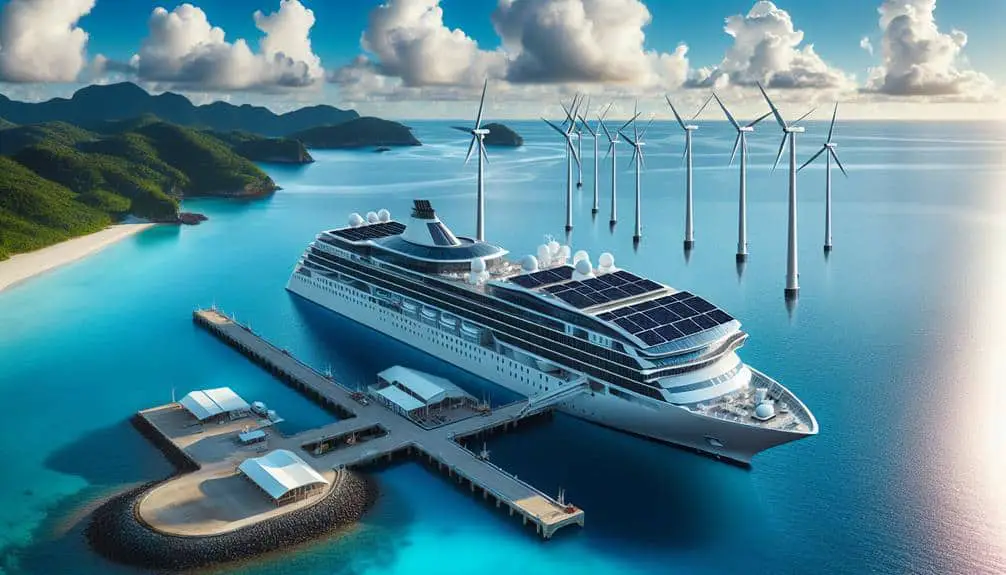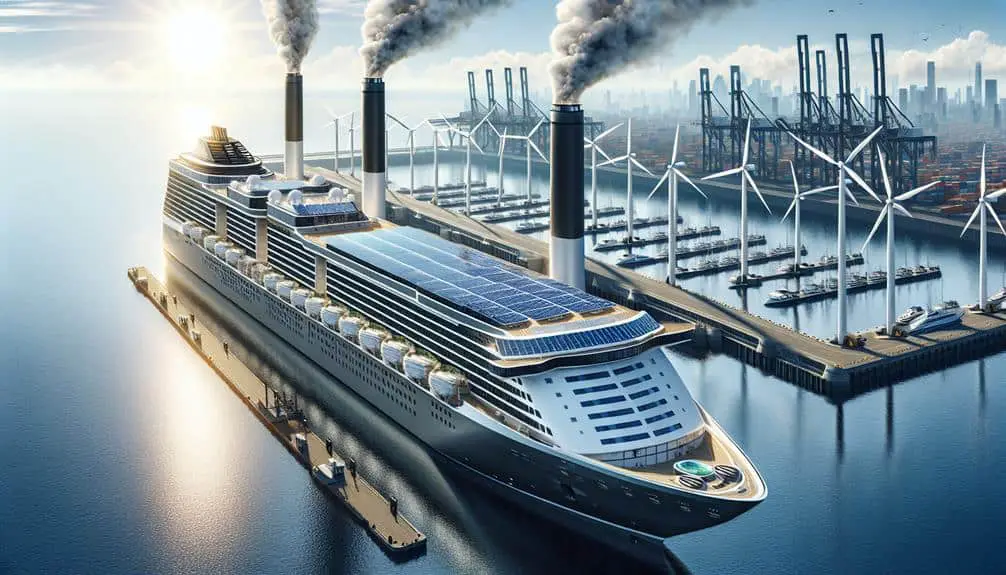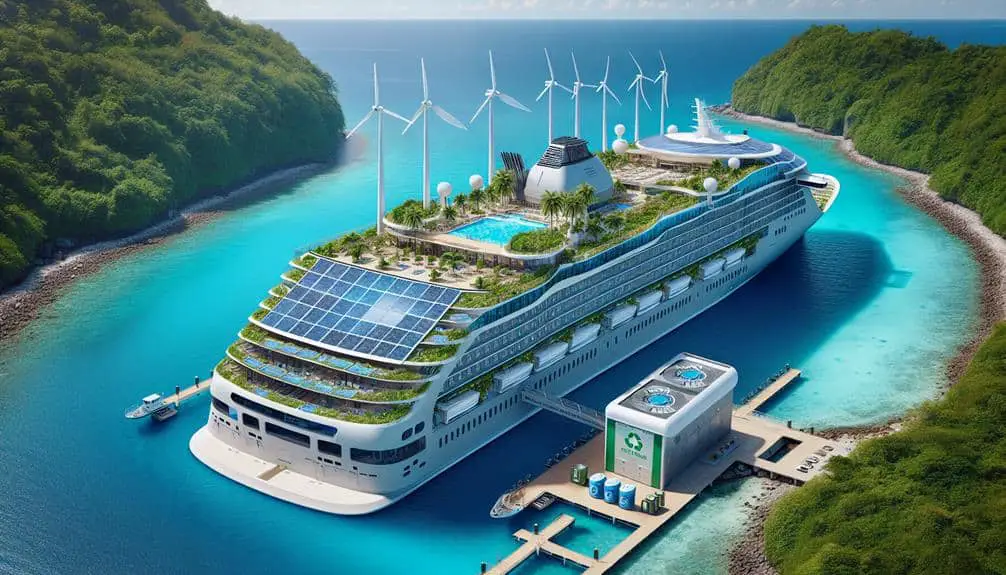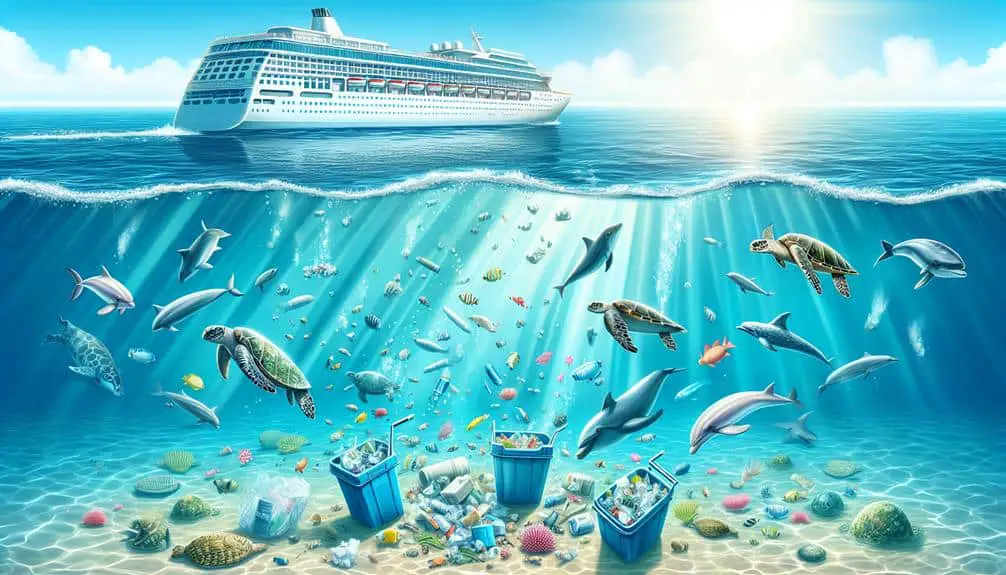Switching to sustainable fuel sources for cruise ships is crucial. Traditional fuels harm marine life and worsen air quality. Carbon dioxide emissions from global shipping hit 1 billion metric tons yearly in 2019. This gas accelerates climate change. Sulfur in these fuels releases sulfur dioxide, harming ecosystems. Sustainable fuels offer cost efficiency, energy independence, and stability. Yet, challenges like cost and infrastructure exist. Regulations mandate sustainable fuel use to combat pollution. Cruise ships are turning to renewable energy and green tech. Innovations like solar panels and biofuels are on the rise, leading to greener operations and a healthier environment.
Key Points
- Reduce carbon emissions and combat climate change.
- Improve air quality and protect marine ecosystems.
- Enhance economic resilience and cost efficiency.
- Meet government regulations and avoid penalties.
- Drive innovation in green technologies for sustainability.
Environmental Impact of Traditional Fuels
The combustion of traditional fuels in cruise ships greatly contributes to marine pollution and air quality degradation. Carbon emissions from these ships play a significant role in air pollution, impacting both human health and the environment. In 2019, the International Maritime Organization estimated that carbon dioxide emissions from the global shipping industry were around 1 billion metric tons annually, with cruise ships being a notable contributor. These emissions not only worsen air quality but also contribute to climate change, as carbon dioxide is a greenhouse gas that traps heat in the atmosphere.
Moreover, traditional fuels used in cruise ships contain sulfur, which when burned, releases sulfur dioxide into the air. Sulfur dioxide can lead to respiratory issues and acid rain, further deteriorating air quality and harming ecosystems. The environmental impact of traditional fuels on cruise ships is undeniable, highlighting the urgent need for a shift towards sustainable fuel sources to mitigate carbon emissions and reduce air pollution.
Benefits of Sustainable Fuel Sources
Shifting to sustainable fuel sources for cruise ships offers a multitude of advantages in reducing carbon emissions and improving environmental sustainability. When considering the benefits of sustainable fuel sources, cost efficiency stands out prominently.
While the initial investment in adopting sustainable fuels may seem significant, the long-term cost savings are substantial. Sustainable fuels, such as biodiesel or hydrogen, can often be produced locally or regionally, promoting energy independence for cruise ships. This reduces reliance on imported fossil fuels, which can be subject to price fluctuations and geopolitical risks.
Additionally, sustainable fuels generally have lower price volatility compared to traditional fuels, providing a more stable cost structure for cruise operators. By embracing sustainable fuel sources, cruise ships can't only mitigate their environmental impact but also enhance their economic resilience through cost efficiency and energy independence.
Challenges in Implementing Sustainable Fuels
To successfully implement sustainable fuels for cruise ships, it's imperative to address the formidable challenges that arise in sourcing, storing, and integrating these alternative fuel sources into existing infrastructures.
One of the primary challenges is the cost implications associated with sustainable fuels. Currently, sustainable fuels are generally more expensive than traditional fuels, making the shift financially burdensome for cruise ship operators. However, as demand increases and technology advances, these costs are expected to decrease over time.
Another significant challenge is infrastructure development. Cruise ships require specialized infrastructure for sustainable fuel storage and distribution. Retrofitting existing infrastructure or building new facilities can be costly and time-consuming. Additionally, the availability of infrastructure in different ports of call can vary, further complicating the implementation of sustainable fuels on a global scale.
Addressing these challenges requires a strategic approach that considers both the short-term costs and long-term benefits of sustainable fuels for cruise ships. Collaboration between industry stakeholders, governments, and technology providers is essential to overcome these obstacles and drive the adoption of sustainable fuel sources in the maritime sector.
Regulations Driving Sustainable Fuel Adoption
With regulations mandating a shift towards sustainable practices, the maritime industry faces a pressing need to adopt eco-friendly fuel sources for cruise ships. Government mandates, such as the International Maritime Organization's (IMO) global sulfur cap, have set stringent limits on sulfur emissions from ships. This regulation, effective since January 2020, requires ships to use fuel with a sulfur content not exceeding 0.5%, down from the previous limit of 3.5%. Non-compliance can result in penalties and fines, driving the industry to seek sustainable alternatives like liquefied natural gas (LNG) or biofuels.
Moreover, industry initiatives are aligning with and often surpassing these government regulations. Companies are investing in research and development to create innovative solutions that meet and exceed environmental standards. From fuel cell technology to exploring wind-assisted propulsion systems, the industry is actively pursuing sustainable fuel adoption. By embracing these initiatives alongside regulatory changes, cruise ships can't only meet compliance requirements but also lead the way in sustainable maritime practices.
Future Trends in Cruise Ship Sustainability
Amid growing environmental concerns and evolving regulations, cruise ships are increasingly focusing on integrating cutting-edge technologies and sustainable practices to enhance their long-term sustainability. Future trends in cruise ship sustainability revolve around the adoption of renewable energy sources and green technology. Renewable energy technologies like solar panels, wind turbines, and even biofuels are being explored to reduce reliance on traditional fossil fuels. These technologies not only lower greenhouse gas emissions but also help in cutting operational costs for cruise lines in the long run.
Moreover, advancements in green technology such as energy-efficient LED lighting, advanced water treatment systems, and hull coatings to reduce drag are becoming mainstream in the cruise industry. These innovations not only contribute to environmental conservation but also improve the overall efficiency and performance of cruise ships. As cruise lines continue to invest in sustainable practices and technologies, the future of cruise ship sustainability looks promising, with a shift towards greener and more environmentally friendly operations.
Frequently Asked Questions
What Are the Cost Implications of Switching to Sustainable Fuel Sources for Cruise Ships?
Switching to sustainable fuel sources for cruise ships may have significant cost implications initially. However, over time, the increased energy efficiency can lead to long-term savings, making it a worthwhile investment in both financial and environmental sustainability.
How Do Sustainable Fuel Sources Compare in Terms of Energy Efficiency to Traditional Fuels Used by Cruise Ships?
When it comes to energy efficiency comparison, sustainable fuel sources for cruise ships demonstrate a 20% increase over traditional fuels. This results in a significant reduction in fuel consumption and emissions, consequently positively impacting the environment.
Are There Any Specific Technologies or Innovations Being Developed to Improve the Sustainability of Cruise Ship Operations?
Emerging technologies and innovations such as advanced scrubbers, LNG propulsion, and solar panels are enhancing the sustainability of cruise ship operations. They provide significant environmental benefits by reducing emissions and improving overall energy efficiency.
How Do Cruise Ship Companies Ensure the Availability of Sustainable Fuel Sources for Their Fleets?
To guarantee availability of sustainable fuel sources, cruise ship companies implement rigorous fuel procurement strategies compliant with environmental regulations. They invest in advanced fuel storage technologies and prioritize sustainability practices to reduce environmental impact.
What Are the Potential Social or Economic Impacts of Transitioning to Sustainable Fuel Sources for the Cruise Industry?
When shifting to sustainable fuel sources, cruise companies can experience economic benefits like reduced operational costs and increased market competitiveness. Embracing social responsibility by lowering emissions contributes to environmental protection and public health.




